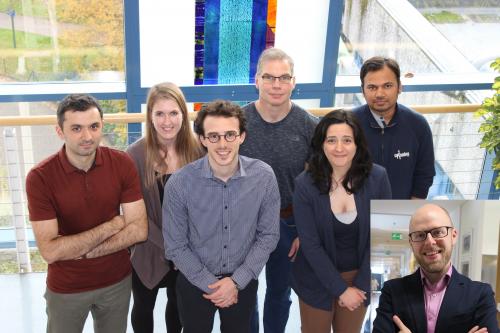
Mutations in genes encoding PINK1 (PTEN-induced kinase 1) and the ubiquitin E3 ligase Parkin are associated with early-onset Parkinson’s disease. Several years ago the laboratory of Miratul Muqit discovered that upon mitochondrial damage, PINK1 can phosphorylate Parkin at a highly conserved residue, Serine 65 (Ser65), that lies within its N-terminal Ubiquitin-like domain (Ubl). Further, it was discovered that PINK1 can phosphorylate Ubiquitin at an equivalent Ser65 residue and this associates with Parkin in a complex to trigger maximal activation of Parkin E3 ligase activity.
The PINK1-dependent regulation of Parkin activity has been shown to be essential for mitochondrial quality control in many cell types. However, an outstanding question in the field was whether disruption of this signalling pathway is relevant to the pathogenesis of Parkinson’s disease.
To address this question, postdoctoral scientist, Tom McWilliams generated and characterized a knock-in mouse model of Parkin in which the phosphorylatable Ser65 residue was mutated to an Alanine (Ala). Biochemical analysis of primary cortical neurons was undertaken by post-doc Erica Barini, and this revealed that Parkin activity was completely abolished in the mutant knock-in mice. Furthermore, there was no detectable accumulation of phosphorylated ubiquitin in neurons consistent with the loss of Parkin activity.
The Ser65Ala knock-in mice also exhibited motor deficits after 1 year of age and this was associated with impaired mitochondrial respiration in the striatum of the brain. To address whether this led to defects in mitophagy, Tom crossed the knock-in mice with the mito-QC mitophagy reporter mice developed Ian Ganley’s lab. Together with Francois Singh from the Ganley lab and senior scientist Alan Prescott, Tom did not observe any significant alteration in basal mitophagy in the nigrostriatal pathway consistent with his previous findings that basal mitophagy in the brain is independent of PINK1.
However, mouse models do not successfully recapitulate the pathology of human Parkinson’s disease. Serendipitously in collaboration with Professors Anu Suomalainen-Wartiovaara and Pentti Tienari at the University of Helsinki, a Finnish Parkinson’s patient was identified to have a homozygous mutation of Parkin Ser65 to an Asparagine (Asn) residue. The pathogenicity of the Parkin Ser65Asn mutation was confirmed by a series of biochemical and structural studies performed by PhD students Kristin Balk, Odetta Antico and post-doc Atul Kumar with a major contribution by Dr Axel Knebel. Critically a skin biopsy was obtained from the patient and post-doc Sophie Burel was able to demonstrate that Parkin activation was completely abolished in Parkin Ser65Asn primary skin fibroblasts. In collaboration with the Ganley lab, PhD student Lambert Montava Garriga was also able to show that mitophagy was unaffected in the Parkin mutant fibroblasts. Finally a second Parkinson’s patient harbouring homozygous Parkin Ser65Asn mutations was identified from the Parkinson’s Progression Markers Initiative (PPMI) coordinated by the Michael J Fox Foundation.
Overall these mouse and human studies provide the most direct evidence to date that the PINK1-dependent activation of Parkin is a key pathway that is disrupted in the development of Parkinson’s disease. The findings of this study will boost efforts to develop small molecular activators of PINK1 and/or Parkin as a potential therapy against Parkinson’s. The tools to monitor Parkin and Ubiquitin phosphorylation developed in this study will also help address outstanding clinical questions on whether the PINK1-Parkin pathway is disrupted in patients with sporadic Parkinson’s who lack mutations in the PINK1 and Parkin genes.
The research was funded by the Wellcome Trust, Medical Research Council, Parkinson’s UK, J Macdonald Menzies Charitable Trust, Rosetrees Trust, Michael J Fox Foundation and EMBO. The study involved collaborations with researchers at the University of Helsinki, University of Cardiff, CNRS Inserm Paris and the German Center of Neurodegenerative Diseases in Bonn.
To read a copy of the paper published in Open Biology click here.

